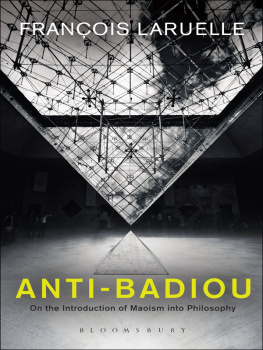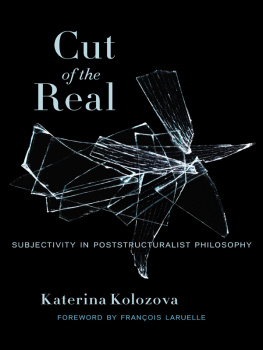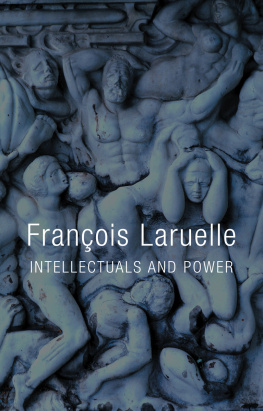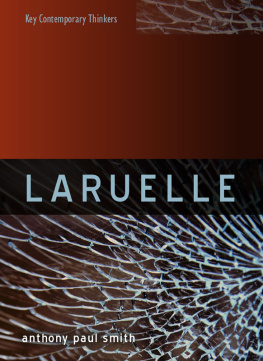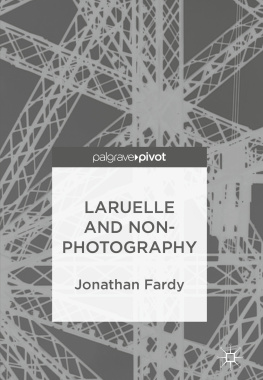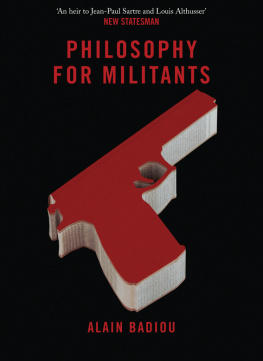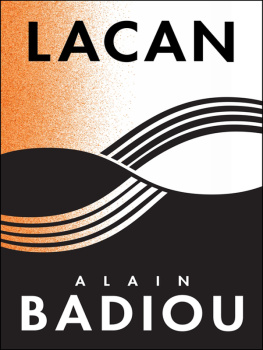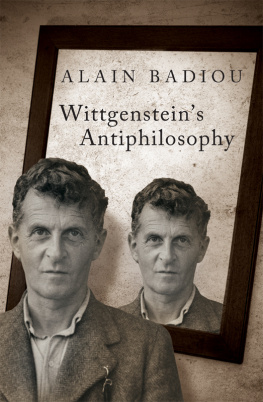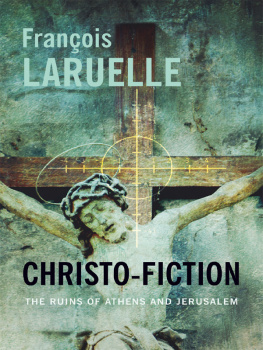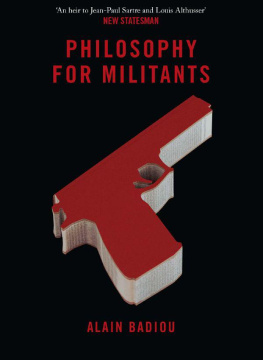Laruelle Francois - Anti-Badiou: the introduction of Maoism into philosophy
Here you can read online Laruelle Francois - Anti-Badiou: the introduction of Maoism into philosophy full text of the book (entire story) in english for free. Download pdf and epub, get meaning, cover and reviews about this ebook. City: London, year: 2012;2017, publisher: Bloomsbury Publishing;Bloomsbury Academic, genre: Science. Description of the work, (preface) as well as reviews are available. Best literature library LitArk.com created for fans of good reading and offers a wide selection of genres:
Romance novel
Science fiction
Adventure
Detective
Science
History
Home and family
Prose
Art
Politics
Computer
Non-fiction
Religion
Business
Children
Humor
Choose a favorite category and find really read worthwhile books. Enjoy immersion in the world of imagination, feel the emotions of the characters or learn something new for yourself, make an fascinating discovery.
- Book:Anti-Badiou: the introduction of Maoism into philosophy
- Author:
- Publisher:Bloomsbury Publishing;Bloomsbury Academic
- Genre:
- Year:2012;2017
- City:London
- Rating:4 / 5
- Favourites:Add to favourites
- Your mark:
- 80
- 1
- 2
- 3
- 4
- 5
Anti-Badiou: the introduction of Maoism into philosophy: summary, description and annotation
We offer to read an annotation, description, summary or preface (depends on what the author of the book "Anti-Badiou: the introduction of Maoism into philosophy" wrote himself). If you haven't found the necessary information about the book — write in the comments, we will try to find it.
Anti-Badiou: the introduction of Maoism into philosophy — read online for free the complete book (whole text) full work
Below is the text of the book, divided by pages. System saving the place of the last page read, allows you to conveniently read the book "Anti-Badiou: the introduction of Maoism into philosophy" online for free, without having to search again every time where you left off. Put a bookmark, and you can go to the page where you finished reading at any time.
Font size:
Interval:
Bookmark:

ALSO AVAILABLE FROM BLOOMSBURY
Being and Event , Alain Badiou
Future Christ , Franois Laruelle
Logics of Worlds , Alain Badiou
Philosophies of Difference , Franois Laruelle
Principles of Non-Philosophy , Franois Laruelle
Anti-Badiou
On the Introduction of Maoism into Philosophy
Franois Laruelle
Translated by Robin Mackay

Bloomsbury Academic
An imprint of Bloomsbury Publishing Plc
50 Bedford Square175 Fifth Avenue
LondonNew York
WC1B 3DPNY 10010
UKUSA
www.bloomsbury.com
Originally published in French as Anti-Badiou: Sur lintroduction du maosme dans la philosophie ditions Kim, 2011
This English translation Bloomsbury Publishing Plc, 2013
All rights reserved. No part of this publication may be reproduced or transmitted in any form or by any means, electronic or mechanical, including photocopying, recording, or any information storage or retrieval system, without prior permission in writing from the publishers.
The author has asserted his right under the Copyright, Designs and Patents Act, 1988, to be identified as Author of this work.
No responsibility for loss caused to any individual or organization acting on or refraining from action as a result of the material in this publication can be accepted by Bloomsbury Academic or the author.
British Library Cataloguing-in-Publication Data
A catalogue record for this book is available from the British Library.
ISBN: 978-1-4411-5870-3
Library of Congress Cataloging-in-Publication Data
Laruelle, Franois.
Anti-Badiou: on the introduction of Maoism into philosophy / Franois Laruelle; translated by Robin Mackay. First [edition]. pages cm Includes bibliographical references and index.
ISBN 978-1-4411-9574-6 (hardcover) -- ISBN 978-1-4411-5870-3 (epub) -- ISBN 978-1-4411-9076-5 (ebook (pdf)) 1. Badiou, Alain--Criticism and interpretation. 2. Badiou, Alain--Political and social views. 3. Communism. 4. Philosophy, French--20th century. I. Mackay, Robin (Philosopher), translator. II. Title.
B2430.B274.L3713 2013
194--dc23
2012021338
Typeset by Fakenham Prepress Solutions, Fakenham, Norfolk NR21 8NN

Contents

| FP | Forces of Production |
| K | Kant |
| F | Fichte |
| NP | Non-Philosophy |
| OV | Ontology of the Void |
| PSM | Principle of Sufficient Mathematics |
| PSP | Principle of Sufficient Philosophy |
| RP | Relations of Production |

Re-educating philosophy through mathematics: Purification and terror
Why Badiou? He represents the introduction of Maoism into philosophy, as undertaken by a great philosopherthat is to say, a philosopher entirely apartwith all the inherent risk of this will and this greatness. He is an apogee of the modern tradition of philosophy, of its very essence brandished like a standard in the face of mathematics and with its aid. But, beneath this objective appearance, other stakes can be discerned. It would render Badiou banal to describe him merely as a master of Western modernity. His project is more profound: his intention is to re-educate philosophy. Beyond the various proclamations and summationswhich we shall not rely on to prove our point at the level of the most obvious principleshe pursues the project of the re-education of philosophy through mathematics, and not at all that of the constitution of a mathematically based science of philosophy ( supposing such a thing were possible ) . This enterprise has no equivalent in the history of philosophy (except perhaps Plato); but it does have a political model, in the recent history of communism. Badiou would have it that modernity is a fusion of Platonist mathematicism and Maoism, thus demonstrating his astonishing plasticity, his ability to fuse with liberalism on one hand, mathematicism on the other. From this point of view, mathematicism is the condition of communism, with the authoritarian Platonist model finding a new lease of life in Maoism.
Although at first glance the characteristically conservative aspect of all philosophy prevails in Badiou, in fact he cedes nothing to the dominant tradition of philosophy, above all continental and modern philosophy. He practices mathematics to teach and to teach himself, at best to illustrate the concept; a matter of apprenticeship, of the deciphering of a constituted science about which and through which philosophy can educate itself. But to the best of our knowledge, it is not a matter of actual mathematical production, as in Plato and a few rare so-called modern classics. Here, the philosopher of mathematics remains a philosopher, and not a mathematician. That is to say that, if there is no chance here of producing a real breakthrough in mathematics (something that, of course, we do not expect of him), there is also no chance of exceeding the limits of philosophy. With Badiou, philosophy remains well within the bounds of its traditional relationsFrench rather than Anglo-Saxonand those of its history. Even the mathematics and logic that he introduces as conditions for philosophy, he considers under the authority of history, referring to them principally as historical formations. Whence his obsession with the modernwhich, far from delivering itself from history, enchains and immobilizes itself within history. He dedicates himself once more to the reading of textsin this case the mathematical text, but only insofar as it belongs to a ready-made history. After the reading of philosophical texts (Derrida), of Marxist texts on history (Althusser), of Freud (Lacan) and then of the Human Sciences (Foucault), the interpretation of great mathematical texts is invited to take up the baton. It is decidedly the case that here, philosophy (and in particular, French philosophy) falls back into its habitual, pusillanimous mistakes, refusing to experiment with philosophy itself in its being, rather than just its objects, languages and intra-philosophical becomings. This philosophical immobilization by way of history (as obligatory as ever, if often denied) is consummated, paradoxically, in a philosophy without history (Althusser and Badiou). A philosophy that ends up as a lazy queen, who hitches her carriage up to a pack of scientists, and can only get going by riding in the wake of the history of sciences. Accepting the need to reform itself, without making any attempt to reinvent itself, it essentially re-acts to the sciences without acting, properly speaking, upon themany more than it acts upon itself. What little action it has is limited to a reaction , to varying its style and changing one or another of its forms, without abandoning its most traditional objectives, which are those of a superior authority, sometimes legislative, always imperial.
But onto this traditional manner, Badiou grafts another intention which is his own proper mark, neither a mere hermeneutic nor a true invention: the re-education of philosophy a concept that, for Badiou, has a globally political destiny. Education and self-education take place through philosophy; but re-education is a political action carried out upon philosophy itself. And it is carried out in the form of a pure mathematical rectification [ redressement ] , not to say a breaking-in [ re-dressage ] . For here, the Cultural Revolution is no circumstantial topic for intellectual debate, but a theoretical model that can be read transparently even in Badious most theoretical program. Up until Badiou, philosophy was educative and pedagogical; with him, it is re-educated by mathematics. And rather than an invention, re-education is a particular type of repetition ; one that seeks to modify everything while conserving for it the destination and the ends of philosophy. Here is the secret and the justification of the initial (if exorbitant) cut between ontology and philosophya cultural matricide with which Badiou-thought begins. Is this not a new, Maoist, avatar of universal Aufhebung , a manner of conserving philosophy through its re-education by means of dismemberment, redistribution and subtraction? The old duality surpassing/conserving is now relayed by conservation/re-education. Philosophy will be forced out of itself, will be forced to send its intellectuals to the narrowest and harshest of schools. But this is still a way of conserving, in all essential respects, its privileges.
Font size:
Interval:
Bookmark:
Similar books «Anti-Badiou: the introduction of Maoism into philosophy»
Look at similar books to Anti-Badiou: the introduction of Maoism into philosophy. We have selected literature similar in name and meaning in the hope of providing readers with more options to find new, interesting, not yet read works.
Discussion, reviews of the book Anti-Badiou: the introduction of Maoism into philosophy and just readers' own opinions. Leave your comments, write what you think about the work, its meaning or the main characters. Specify what exactly you liked and what you didn't like, and why you think so.

